HRC56: A call to recognise migrants’ contributions to societies
56th session of the Human Rights Council
18th June-12th July 2024
Item 3: Promotion and protection of all human rights, civil, political, economic, social and cultural rights, including the right to development. Rights of people and of specific groups and individuals. Human rights of migrants
25 June 2024
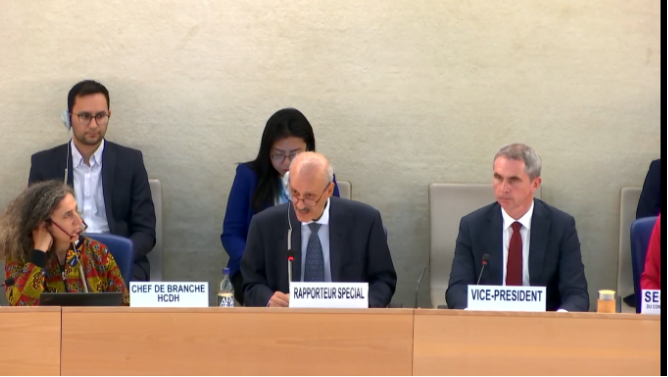
By Patricia Mutebi Jjuuko/GICJ
Executive Summary
On 25 June 2024, the 12th meeting of the 56th session of the Human Rights Council considered the report of the Special Rapporteur on the human rights of migrants (A/HRC/56/54) during an interactive dialogue. In his report, Gehad Madi examined migrants’ sociocultural, civic-political and economic contributions to societies. The report offers a reminder of the wealth of opportunities that migration presents to societies willing to embrace diversity and inclusion at a time when the political discourse around migration has taken a negative turn, with migration-related disinformation and xenophobia on the rise. Mr Madi scrutinised the factors hindering recognition of migrants’ contributions and offered recommendations on enabling positive migration-related narratives to flourish.
Additionally, the Special Rapporteur emphasised that migrants' rights should be upheld and protected regardless of their contribution to society. He called on member states and stakeholders to refocus their attention on migrants’ contributions and evaluate them using comprehensive frameworks that encompass social culture enrichment, civil-political engagement, and economic benefits.
In the ensuing discussion, states voiced concerns about the lack of recognition of the contributions of migrants and the rise of negative discourse on migration. Member states deplored an increasing tendency in some states to stigmatise migrants and view them as a threat to their culture, security, stability and socioeconomic systems. Most representatives called for states to implement coherent legislative and policy interventions to protect the rights of migrants.
Geneva International Centre for Justice (GICJ) congratulates the Special Rapporteur on delivering his first report. We echo Mr Madi’s condemnation of discrimination, racism, and xenophobia against migrants. GICJ calls on Member States, international organisations, NGOs, and civil society groups to adhere to the Global Compact for Migration, which provides a common framework for creating societies where the human rights of migrants are fully realised.
Background
The mandate of the Special Rapporteur on the Human Rights of Migrants was created in 1999 by the Commission on Human Rights, according to resolution 1999/44. The mandate aims to examine ways and means to overcome the obstacles existing to the full and adequate protection of the human rights of all migrants at all stages of migration. The mandate also elaborates recommendations on strengthening the promotion, protection and implementation of the human rights of all migrants.
Gehad Madi, the current mandate holder, was appointed by the Human Rights Council in October 2023 as the United Nations Special Rapporteur on the human rights of migrants. His first report presented to the Human Rights Council at its fifty-sixth session, is according to General Assembly resolution 76/172 and Council resolution 52/20. In his first report, the Special Rapporteur focuses on migrants’ contribution to society and calls for States to refocus on migrants’ contributions and to be willing to embrace diversity and inclusion.
Report of the Special Rapporteur
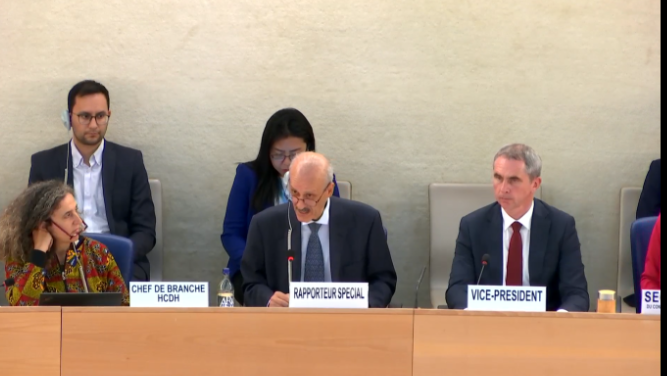 In his report, Gehad Madi, the Special Rapporteur on the human rights of migrants, declared that the promotion and protection of migrants' human rights are crucial at a time when the political discourse around migration has taken a negative, inflammatory, and divisive turn. The report highlights that migration-related disinformation and xenophobia are on the rise, and many have forgotten the benefits of migration.
In his report, Gehad Madi, the Special Rapporteur on the human rights of migrants, declared that the promotion and protection of migrants' human rights are crucial at a time when the political discourse around migration has taken a negative, inflammatory, and divisive turn. The report highlights that migration-related disinformation and xenophobia are on the rise, and many have forgotten the benefits of migration.
The Special Rapporteur pointed out that historically, countries open to migration have recognised the potential of lower-income migrants, welcoming labor migrants from Europe who were surplus to the needs of the labour market of the time and often arrived with nothing. Many success stories in the 19th and 20th centuries feature migrants who overcame adversity, spurred entrepreneurship and job creation and contributed to shaping prosperous high-income countries. However, today, strict immigration criteria prevent many such individuals from migrating regularly. He underscored that the hostile, dehumanising, and criminalising narratives surrounding migrants, in particular those in irregular situations, demonstrate a lack of understanding of the context.
Mr Madi emphasised that migrants are rights holders, and their rights should be fully respected and protected regardless of their contribution to society. All States need to recognise the inherent human dignity of migrants and State human rights obligations under international human rights law. The Special Rapporteur’s report reminds us of the wealth of opportunities that migrants and migrants present to societies willing to embrace diversity and inclusion. He called on Member States and stakeholders to refocus attention on migrants’ contributions and evaluate them with a comprehensive framework that encompasses sociocultural enrichment, civic, political engagement and economic benefits.
Migrants make various civic and political contributions that enrich host societies and lead to significant positive changes in countries of origin. The Special Rapporteur further highlighted that migrants often contribute to developing more inclusive democratic and participatory governance structures and bring new perspectives to political forums. They serve as bridges between host and origin countries, fostering diplomatic ties and international collaboration. Migrants contribute to the economy in various ways, with higher labour force participation rates than non-migrants. Mr Madi pointed out that they form a crucial portion of the workforce at 4.9% in 2019 and over 41% in Arab States. Migrants can contribute to countries' labour market flexibility, often filling critical labour shortages from highly skilled positions in sectors such as technology and health care to essential roles in agriculture and services industries.
The Special Rapporteur noted in his report that migrants can bolster a nation's physical well-being through tax and social security contributions. Remittances from migrants play a pivotal role in economies of low- and middle-income countries, reaching 669 billion US dollars in 2023, which exceeds foreign direct investment and far outstrips official development assistance. Mr. Madi pointed out several factors that have shifted societal perception of migrants. Many countries have adopted selective immigration policies with divisive views of desirable and undesirable migrants, creating cross inequalities in terms of access to regular migration with people in lower-income countries, mainly African countries.
Migrants frequently encounter discrimination and xenophobia in both transit and destination countries, curtailing the prospects, access to services and social inclusion. Migrants in irregular situations often find that human rights are not recognised, affecting their safety, dignity and ability to participate in and contribute to society. In other cases, despite their contributions, migrants are in irregular situations. Women are often denied social protection, increasing their risks of poverty and exploitation.
Mr. Madi concluded his report by stating that supporting an evidence-based narrative on migration is crucial for upholding migrants' rights and ensuring that their contributions are acknowledged and valued. He stressed that to foster migrants' contribution in society, governments should establish a department to refocus attention on the benefits that well-managed migration offers, strengthening anti-discrimination laws and initiatives, ensuring the protection of human and labour rights of migrants, supporting legislation and initiatives aimed at migrant integration, empower migrants by ensuring freedom of association and collective bargaining, guarantee migrants access to legal remedies for human rights violations, expand regular pathways and regularisation programs, make efforts to promote an evidence-based narrative about migration are crucial for acknowledging and maximising migrant contribution to society.
Interactive Dialogue
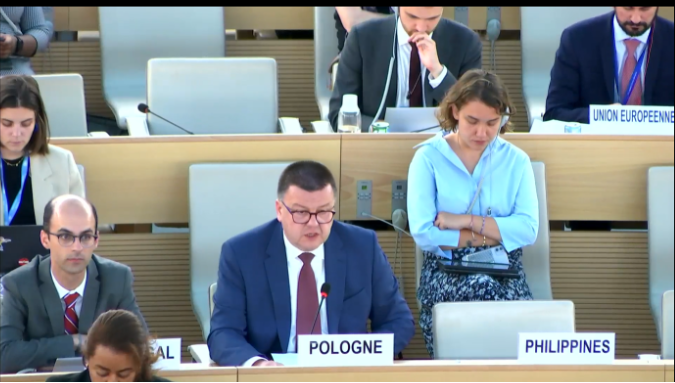 In the ensuing interactive dialogue, Poland, on behalf of the Lublin Triangle States, highlighted they attach great importance to advancing all human rights, including the human rights of migrants. They condemned Belarus' instrumentalisation of migration, where vulnerable individuals are exploited and lured with false promises of easy entry into the EU. Migrants are left in dire conditions at the border, facing violence, harsh weather and lack of necessities, highlighting severe human rights abuses. The delegate stated that Belarus' actions aim to destabilise the region by creating divisions within the European Union and testing the resilience of the EU policies on migration and border control. The delegate noted with great concern Russia's practice of forcible recruitment of migrants for war against Ukraine under the threat of deportation.
In the ensuing interactive dialogue, Poland, on behalf of the Lublin Triangle States, highlighted they attach great importance to advancing all human rights, including the human rights of migrants. They condemned Belarus' instrumentalisation of migration, where vulnerable individuals are exploited and lured with false promises of easy entry into the EU. Migrants are left in dire conditions at the border, facing violence, harsh weather and lack of necessities, highlighting severe human rights abuses. The delegate stated that Belarus' actions aim to destabilise the region by creating divisions within the European Union and testing the resilience of the EU policies on migration and border control. The delegate noted with great concern Russia's practice of forcible recruitment of migrants for war against Ukraine under the threat of deportation.
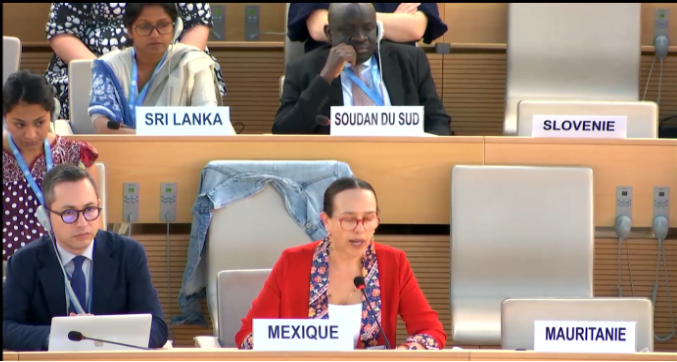 Subsequently, on behalf of a group of 27 countries, Mexico affirmed their duty to respect, protect and fulfil their human rights. The delegate stated that recognising migrants’ positive contribution will significantly help fertilise a human rights-based approach in the global migration agenda while at the same time galvanising social and economic development. The delegate called on all states to strengthen measures to promote human rights and highlight migrants' contribution and their positive impacts in countries of origin, transit and destination.
Subsequently, on behalf of a group of 27 countries, Mexico affirmed their duty to respect, protect and fulfil their human rights. The delegate stated that recognising migrants’ positive contribution will significantly help fertilise a human rights-based approach in the global migration agenda while at the same time galvanising social and economic development. The delegate called on all states to strengthen measures to promote human rights and highlight migrants' contribution and their positive impacts in countries of origin, transit and destination.
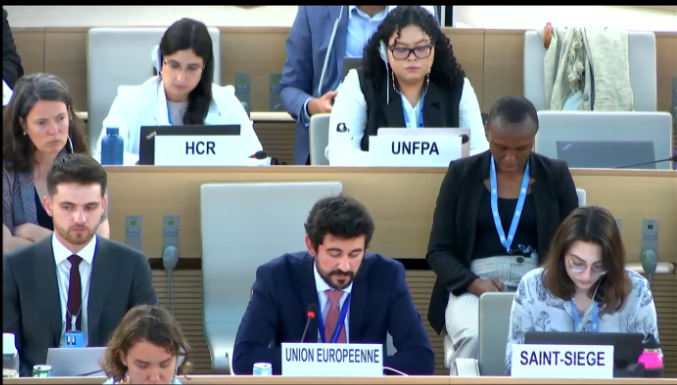 The European Union noted that unsafe and irregular migration pathways, migrant smuggling, human trafficking and ongoing conflicts can exacerbate migrants' vulnerability and marginalisation, putting their human rights and safety at risk often by embarking on dangerous journeys. The delegate highlighted EU Member States' policies; the EU's pact on migration and asylum puts forward a comprehensive approach to a sustainable migration and asylum system based on respect for human rights and with mechanisms to monitor compliance.
The European Union noted that unsafe and irregular migration pathways, migrant smuggling, human trafficking and ongoing conflicts can exacerbate migrants' vulnerability and marginalisation, putting their human rights and safety at risk often by embarking on dangerous journeys. The delegate highlighted EU Member States' policies; the EU's pact on migration and asylum puts forward a comprehensive approach to a sustainable migration and asylum system based on respect for human rights and with mechanisms to monitor compliance.
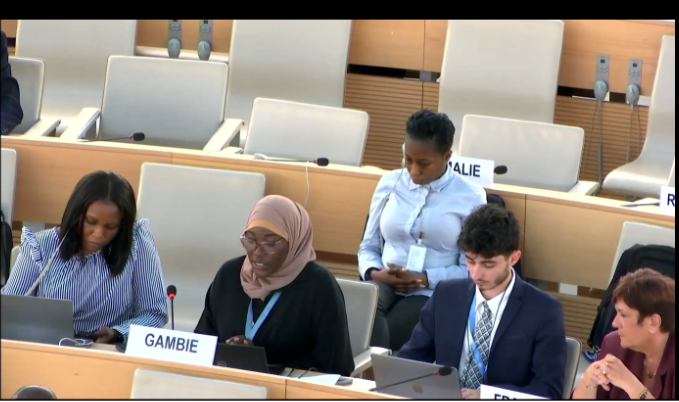 The Gambia, on behalf of the group of African States, stated that migration is an integral part of their shared history and that the African continent is both a host and a departure zone for migrants. The African group remains concerned about the increasing tendency in some states to stigmatise migrants and view them as a threat to their culture, security, stability and socioeconomic systems. The group called for a paradigm shift in how migrants are perceived and treated in host countries and for respecting their human dignity in accordance with relevant international legal instruments, particularly the global compact for migration. The delegate underscored that conscious of the need to promote and protect the rights of migrants, refugees and asylum seekers, the African Union adopted the African guidelines on the human rights of all migrants, refugees and asylum seekers in October 2023. These guidelines aim to strengthen its legal framework for protecting the rights of migrants, considering the specific context of migration.
The Gambia, on behalf of the group of African States, stated that migration is an integral part of their shared history and that the African continent is both a host and a departure zone for migrants. The African group remains concerned about the increasing tendency in some states to stigmatise migrants and view them as a threat to their culture, security, stability and socioeconomic systems. The group called for a paradigm shift in how migrants are perceived and treated in host countries and for respecting their human dignity in accordance with relevant international legal instruments, particularly the global compact for migration. The delegate underscored that conscious of the need to promote and protect the rights of migrants, refugees and asylum seekers, the African Union adopted the African guidelines on the human rights of all migrants, refugees and asylum seekers in October 2023. These guidelines aim to strengthen its legal framework for protecting the rights of migrants, considering the specific context of migration.
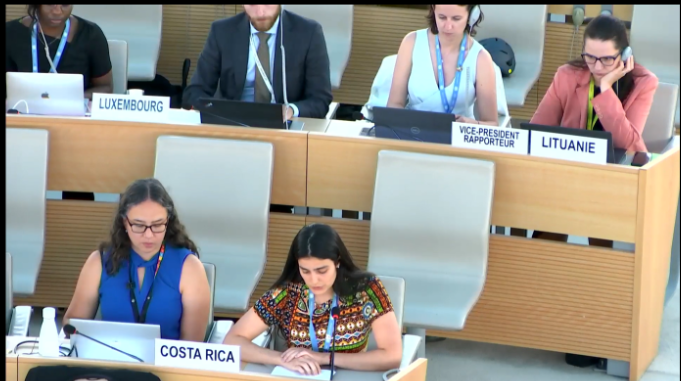 On behalf of a Group of Countries, Costa Rica called on Member States to ensure and support safe and regular pathways for migration and foster information exchange and cooperation between countries of origin, transit and destination based on their shared and respective responsibilities. The delegate also stated that it is necessary to combat trafficking and migrant smuggling, develop domestic public policies to tackle xenophobia and hate speech and prevent human rights violations and abuses against members of migrant communities as well as other forms of insecurity.
On behalf of a Group of Countries, Costa Rica called on Member States to ensure and support safe and regular pathways for migration and foster information exchange and cooperation between countries of origin, transit and destination based on their shared and respective responsibilities. The delegate also stated that it is necessary to combat trafficking and migrant smuggling, develop domestic public policies to tackle xenophobia and hate speech and prevent human rights violations and abuses against members of migrant communities as well as other forms of insecurity.
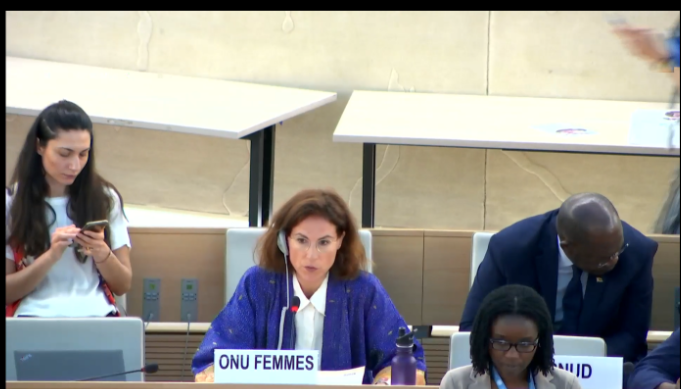 The delegate of UN Women pointed out that migrant women noted that migrant women often face difficulties in obtaining work permits and having their contributions recognised in destination countries and their qualifications, leading to wasted potential. They often work in lower-skilled jobs, heightening the risks of labour exploitation and abuse, while many, particularly those in irregular situations, are often denied social protection. The delegate noted that to reduce the use of dangerous irregular migration channels and better protect their rights, all migrants must have access to safe and regular migration pathways. Giving migrant women choices, and guaranteeing access to decent work, social protection, and services is the surest way to make migration work for all.
The delegate of UN Women pointed out that migrant women noted that migrant women often face difficulties in obtaining work permits and having their contributions recognised in destination countries and their qualifications, leading to wasted potential. They often work in lower-skilled jobs, heightening the risks of labour exploitation and abuse, while many, particularly those in irregular situations, are often denied social protection. The delegate noted that to reduce the use of dangerous irregular migration channels and better protect their rights, all migrants must have access to safe and regular migration pathways. Giving migrant women choices, and guaranteeing access to decent work, social protection, and services is the surest way to make migration work for all.
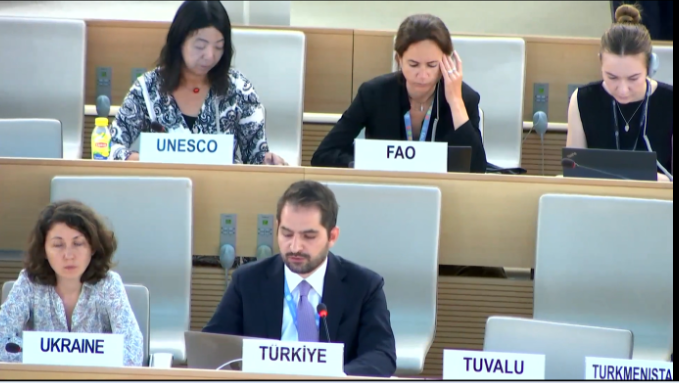 Turkey underscored that incorporating and implementing international human rights and labour standards to guarantee migrant workers’ rights is crucial. As the country hosting the largest refugee population in the world, they called on States that have not yet done so to ratify the international convention on the protection of the rights of all migrant workers and members of their families.
Turkey underscored that incorporating and implementing international human rights and labour standards to guarantee migrant workers’ rights is crucial. As the country hosting the largest refugee population in the world, they called on States that have not yet done so to ratify the international convention on the protection of the rights of all migrant workers and members of their families.
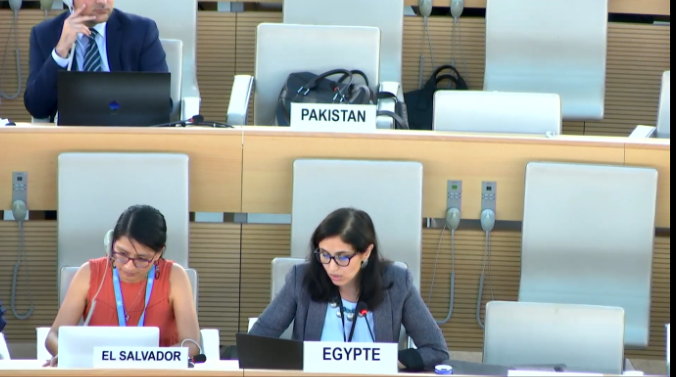 Egypt stressed the need to deal with human mobility comprehensively because people on the move need international protection. The delegate underscored the need for the international community to implement the principle of responsibility sharing with host countries which host many refugees, supporting them to sustain services and reinforcing the integration of refugees and migrants in host countries.
Egypt stressed the need to deal with human mobility comprehensively because people on the move need international protection. The delegate underscored the need for the international community to implement the principle of responsibility sharing with host countries which host many refugees, supporting them to sustain services and reinforcing the integration of refugees and migrants in host countries.
Ethiopia highlighted that as an origin, transit, and destination country for international migration, it attaches great importance to addressing the root cause of regular migration by creating decent livelihood and employment opportunities for potential migrants, especially women and girls.
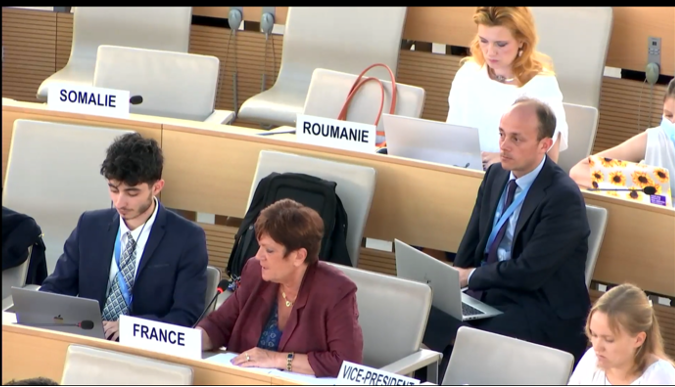 France noted that respect for fundamental freedoms remains a standing requirement, as implemented in its asylum policies in 2023. The delegate stated that 60,000 persons were given asylum in France, and it cooperates with its partners to combat the smuggling of migrants and the trafficking of human beings.
France noted that respect for fundamental freedoms remains a standing requirement, as implemented in its asylum policies in 2023. The delegate stated that 60,000 persons were given asylum in France, and it cooperates with its partners to combat the smuggling of migrants and the trafficking of human beings.
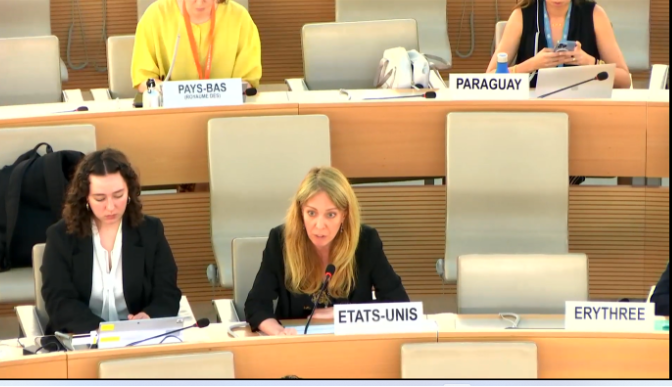 The United States of America noted that it has welcomed more than 3.6 million refugees into communities across the country since 1975 and remains dedicated to finding durable solutions for those who have been displaced. The delegate noted that they continue to expand access to lawful pathways to the United States while focusing on mitigating the root causes of irregular migration. The delegate concluded by asking what successful strategies have contributed to the progress in changing the narrative of migrants as a problem to migrants as solutions.
The United States of America noted that it has welcomed more than 3.6 million refugees into communities across the country since 1975 and remains dedicated to finding durable solutions for those who have been displaced. The delegate noted that they continue to expand access to lawful pathways to the United States while focusing on mitigating the root causes of irregular migration. The delegate concluded by asking what successful strategies have contributed to the progress in changing the narrative of migrants as a problem to migrants as solutions.
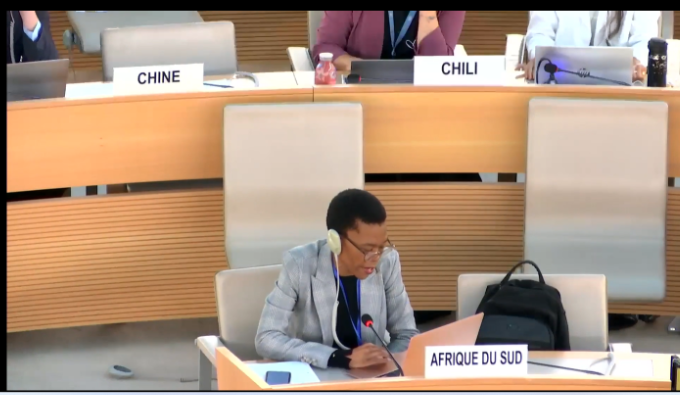 South Africa noted that migrants’ rights are protected and enshrined within its constitution and various legislation and policies. The delegate underscored that well-managed migration requires the harmonisation of policies that take into consideration a state's social, economic, and developmental needs and capacity.
South Africa noted that migrants’ rights are protected and enshrined within its constitution and various legislation and policies. The delegate underscored that well-managed migration requires the harmonisation of policies that take into consideration a state's social, economic, and developmental needs and capacity.
NGO Representatives echoed that migrants are rights holders, and their rights should be protected regardless of their contributions to society. To reduce intolerance, NGO representatives urged States to raise awareness of xenophobia and racial discrimination. They also called on States and UN entities to implement and facilitate the inclusion of migrants in policy and planning processes. On ending border violence, NGO representatives called on the Council to establish and investigate mechanisms for human rights violations at international borders.
Concluding remarks from Special Rapporteur
Mr Madi, in his concluding remarks, called on countries of origin and destination to work closely on ethical recruitment and include migrants in such a process. Bilateral agreements on labour migration should be based on international standards and should prioritise the full implementation of human rights and labour rights of migrants. He emphasised the importance of enacting and implementing anti-discrimination legislation and legislation that penalises hate crimes targeting migrants. To reduce intolerance, the Special Rapporteur underscored that states should also raise awareness of xenophobia and racial discrimination. Migrants and their communities should be empowered to denounce any acts of violence.
The Special Rapporteur called on Member States to make additional efforts to expand regular pathways and regularise programs, with more emphasis given to integration strategies aimed at fostering social cohesion and upholding the human and labour rights of migrants. He stated that the council will continue its important work with member states to address hate crimes and violence motivated by racism and xenophobia. Mr Madi also suggested that the council invite migrants themselves to events to share their true and inspiring stories, which help to counter harmful story types against immigrants and migration.
Position of Geneva International Centre for Justice
Geneva International Centre for Justice (GICJ) welcomes the report of the Special Rapporteur, which outlines and celebrates many valuable sociocultural, economic, and civic-political contributions made by migrants. GICJ remains concerned with the growing hate speech and fake news inciting discrimination and violence against refugees and migrants, including racial and religious stereotypes. States mustn't limit migration without considering development and humanitarian reasons.
GICJ calls upon States that have not ratified the international convention on the protection of the rights of all migrant workers and members of their families to do so. This sets a moral standard and serves to promote migrants’ rights. To reduce the use of dangerous irregular migration channels and better protect their rights, GICJ urges states to give migrants access to safe and regular migration pathways. Migrants are right holders, and their rights should be protected regardless of their contribution to society; as such, GICJ implores States to give migrants access to health and education services irrespective of their migration condition.







